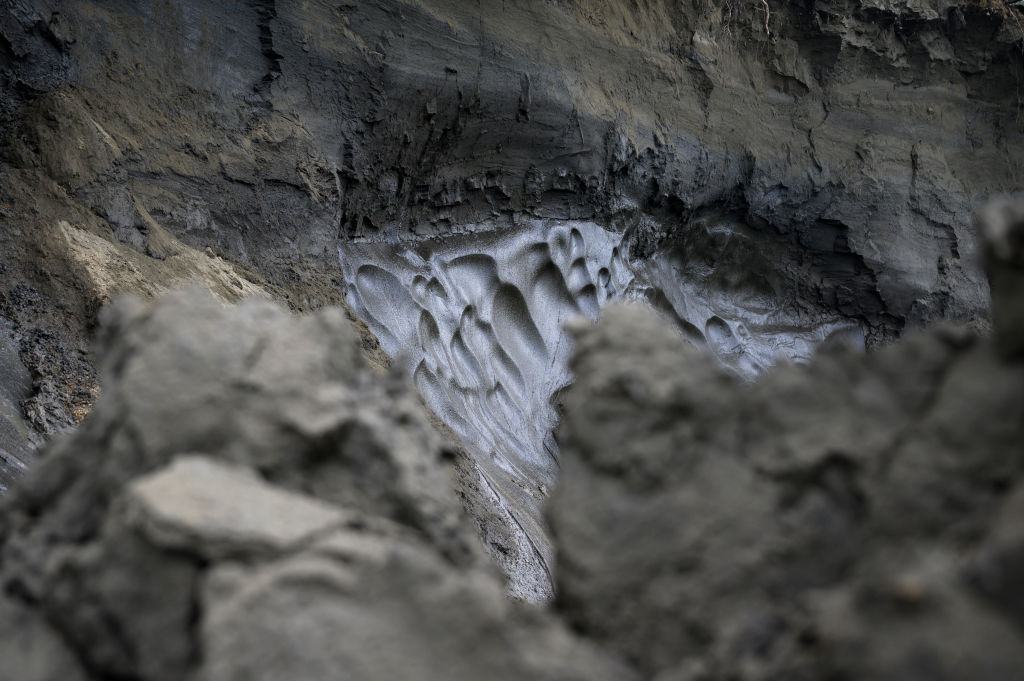Scientists revive 46,000-year-old worm that was frozen in permafrost


A free daily email with the biggest news stories of the day – and the best features from TheWeek.com
You are now subscribed
Your newsletter sign-up was successful
Scientists were able to revive a 46,000-year-old species of worm that had been frozen in permafrost. The findings, published in the journal PLOS Genetics, detailed that these creatures "have developed the ability to enter a state of suspended metabolism called cryptobiosis when environmental conditions are unfavorable," which allows them to "suspend life over geological time scales."
The worm was discovered to be a species of nematode or roundworm called Panagrolaimus kolymaenis, and it was frozen in Siberian permafrost from the time of the woolly mammoths. The nematode remained in a state "between death and life," Teymuras Kurzchalia, professor emeritus at the Max Planck Institute of Molecular Cell Biology and Genetics, who co-authored the study told CNN. "One can halt life and then start it from the beginning. This a major finding."
Nematodes are notoriously resilient, known to survive for long periods of time in treacherous conditions like sub-zero temperatures, per NPR. The worm survived through a process called cryptobiosis, which allowed it to bring its metabolism down substantially and not require water or oxygen. However, "nobody had thought that this process could be for millennia, for 40,000 years — or even longer," Philipp Schiffer, a group leader at the Institute of Zoology at the University of Cologne and one of the study's authors, told NPR.
The Week
Escape your echo chamber. Get the facts behind the news, plus analysis from multiple perspectives.

Sign up for The Week's Free Newsletters
From our morning news briefing to a weekly Good News Newsletter, get the best of The Week delivered directly to your inbox.
From our morning news briefing to a weekly Good News Newsletter, get the best of The Week delivered directly to your inbox.
The worm was revived simply by rehydrating it. "The major take-home message or summary of this discovery is that it is, in principle, possible to stop life for more or less an indefinite time and then restart it," Kurzchalia told The New York Times. As climate change continues to raise temperatures, more permafrost may melt to reveal other creatures that have been dormant for thousands of years.
A free daily email with the biggest news stories of the day – and the best features from TheWeek.com
Devika Rao has worked as a staff writer at The Week since 2022, covering science, the environment, climate and business. She previously worked as a policy associate for a nonprofit organization advocating for environmental action from a business perspective.
-
 The week’s best photos
The week’s best photosIn Pictures An explosive meal, a carnival of joy, and more
-
 The ‘ravenous’ demand for Cornish minerals
The ‘ravenous’ demand for Cornish mineralsUnder the Radar Growing need for critical minerals to power tech has intensified ‘appetite’ for lithium, which could be a ‘huge boon’ for local economy
-
 Why are election experts taking Trump’s midterm threats seriously?
Why are election experts taking Trump’s midterm threats seriously?IN THE SPOTLIGHT As the president muses about polling place deployments and a centralized electoral system aimed at one-party control, lawmakers are taking this administration at its word
-
 How climate change is affecting Christmas
How climate change is affecting ChristmasThe Explainer There may be a slim chance of future white Christmases
-
 Blue Origin launches Mars probes in NASA debut
Blue Origin launches Mars probes in NASA debutSpeed Read The New Glenn rocket is carrying small twin spacecraft toward Mars as part of NASA’s Escapade mission
-
 Why scientists are attempting nuclear fusion
Why scientists are attempting nuclear fusionThe Explainer Harnessing the reaction that powers the stars could offer a potentially unlimited source of carbon-free energy, and the race is hotting up
-
 Dinosaurs were thriving before asteroid, study finds
Dinosaurs were thriving before asteroid, study findsSpeed Read The dinosaurs would not have gone extinct if not for the asteroid
-
 Canyons under the Antarctic have deep impacts
Canyons under the Antarctic have deep impactsUnder the radar Submarine canyons could be affecting the climate more than previously thought
-
 SpaceX breaks Starship losing streak in 10th test
SpaceX breaks Starship losing streak in 10th testspeed read The Starship rocket's test flight was largely successful, deploying eight dummy satellites during its hour in space
-
 NASA is moving away from tracking climate change
NASA is moving away from tracking climate changeThe Explainer Climate missions could be going dark
-
 Rabbits with 'horns' sighted across Colorado
Rabbits with 'horns' sighted across Coloradospeed read These creatures are infected with the 'mostly harmless' Shope papilloma virus
